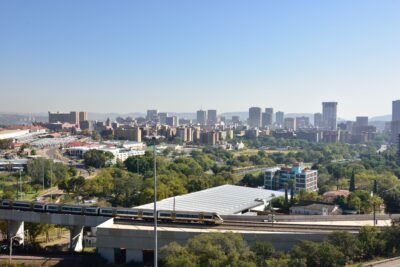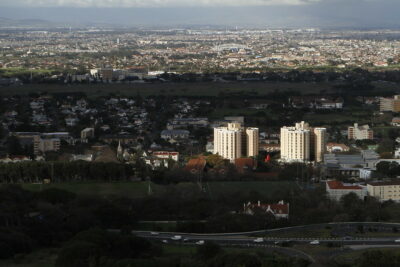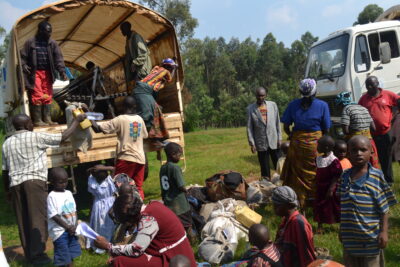The African Peacebuilding Network (APN) recently had the opportunity to sit down with Dr. Jimam Lar, an APN Alumnus (IRG 2016) and lecturer in the University of Jos’s Department of History and International Studies. Dr. Lar was in Washington, DC, for a conference on “Militancy and Conflict in the Sahel and Maghreb,” hosted at the Carnegie Endowment for International Peace in collaboration with the APN. We conducted this interview following his panel at the conference on April 12, 2017. It has been edited for length and clarity.
APN Team: Thank you so much for traveling from Nigeria to be here with us today and for your excellent presentation. Could you please tell us a bit about your research and your APN-supported project?
Dr. Jimam Lar: Thanks so much, it’s a pleasure to be here. My PhD research was about plural policing in central Nigeria. The idea that historically, since the colonial time, the state police has not been the only institution doing policing work on the ground. There’s always been this multiple actor landscape, so I try to account for this history but also to understand how the contemporary variant of this history is contributing to aspects of conflict management and to peacebuilding on the ground.
Coming from an African, a Nigerian, university, there’s little funding to support research. The APN grant came at a very critical time because having done a PhD, you want to then start to embed yourself and build your academic career with research and publications and try to understand general phenomena in society. What I set out to do with the APN research grant was to try to understand the role of local non-state actors in conflict management and transformation. The area I come from, central Nigeria, there are several cases or communities where there have been multiple episodes of violent conflict. A lot of the studies have looked at the role of the government or the state, but I think there’s a knowledge gap about the role that local actors like vigilante groups, traditional rulers, and local police institutions play in conflict management and transformation. So, this is what I set out to do and generally to try to understand why some of these conflicts have been hard to resolve.
You recently wrote an APN Policy Briefing Note as well. Did that stem from your APN-supported fieldwork?
Absolutely. The policy brief tried to show that there is serious agency, serious potential, and serious capacity for engaging with local actors in regards to conflict management and transformation. Also, I argue that this engagement can take place at different levels. There’s a local level, engaging directly with these actors on the ground. There’s the role of the Nigerian state whereby the state can provide structures and laws that accommodate these actors, but also channels and means of accountability and supervision. Civil society can also intervene to provide training and support in terms of the tools that these actors need to expand their work within the locality. I also realize that ECOWAS can also learn a lot from local actors. Instead of the dominant top-down process of conflict management and transformation, we can learn from the best practices of local communities. The important thing is finding an interface between top-down, bottom-up processes. I think this is largely what my policy brief on local actors and conflict management tried to contribute to.
That’s such an important interface, and part of what this event at the Carnegie Endowment for International Peace has tried to achieve: to bring local insight and knowledge to policy actors based here in Washington, DC.
What do you believe is the most critical gap in their understanding of the situation? What advice would you give to those shaping U.S. or international policy towards the region?
In talking to U.S. policymakers, I have commendations but also critiques. The critique is that there is a difficulty in engaging with complexity. African countries like Nigeria, which are very complex, are difficult to understand. In Nigeria, there are so many layers, and to engage with Nigeria, you have to be ready to do this tedious work of taking off these layers one by one. Often policymakers, even in Nigeria, don’t like complexity; they like things to be simple and straightforward. I think the challenge for academics when we engage with policymakers is to try to say that we shouldn’t be discouraged by complexity. We should rather try to understand that these things are not black and white—whether it’s dealing with Boko Haram, with corruption in Nigeria, governance in Nigeria, policing, or the general security development nexus within the Nigerian context. It’s not straightforward because this is a very large country, of about 190 million people, thirty-six states, with several violent conflict challenges all across it.
I do commend those government officials, whether in the State Department or the Department of Defense, who continuously engage, who don’t get tired even when it seems as if it’s hopeless. For them to always know and remember that the work they’re doing is making an impact on the ground even if the results are not showing clearly enough. Like I said, let’s not run away from complexity, let’s try to understand it.
Absolutely. It seems that much of the emphasis in the past has been on military solutions, but this event has discussed how to go beyond that, how the international community can engage in development-oriented solutions.
There’s a famous saying in Nigeria that if the hammer is your only tool, every problem looks like a nail. So we need to have more tools and even work outside of the toolbox, in order to understand the problem for what it is rather than seeing it as a nail. It cannot be emphasized enough that within these problems, the manifestation of the problem might look as if it’s solely a security issue, but it’s also developmental; it’s also about governance; it’s also about contestation, exclusion, and land issues. It could masquerade as a security issue, but deep down we realize that there’s more to it than that. We must use a multi-pronged approach to engaging with these problems going forward.
That’s why the research you and other African researchers are doing on the ground is so important. In terms of early-career researchers, perhaps those who may apply for an APN grant, do you have any advice?
First, while basic research is very good, we have to formulate problems that are applied in nature. We cannot do research for the sake of it. There’s too much at stake not to do applied research. We have to link academic research with policy aspects, this is very important. So, in formulating a question or problem, you have to think about how it will be relevant for policymakers in your country, but also internationally.
Potential applicants to the APN should also consider that it’s a six-month grant, so only bite off what you can chew. It’s good to be ambitious but also be realistic about what can be accomplished in six months. The third thing to consider is to try to be concise in your proposal; go straight to the point. It’s very important that when an assessor is reading the proposal, they know exactly what you want to do and how you are going to do it. Make sure that the methodology links with the research question.
In terms of your own career and research, what role has the APN played?
At the time that I applied, having finished doctoral studies and returned to the University of Jos, I was very keen to engage in methodology because I thought that was a major gap within our academic environment in Nigeria. In terms of research, the APN was a godsend, as we say in Nigeria, because it’s very important for one to develop, expand, and continue with research after finishing a PhD. The grant came at a very critical time when I had finished my PhD and had these burning questions that I was still interested in pursuing and trying to understand. There were all these phenomena that I had come across but didn’t necessarily have the financial leverage to pursue. So when I received the grant, like I said, it was a godsend. It was critical in developing the postdoctoral foundation on which I am continually building as I continue in my career.
That is great to hear. In terms of beyond funding your research, have you found that coming to events like this or the workshops with other APN grantees has benefited your research?
Absolutely, we have a WhatsApp group through which we are always informing each other. We share ideas every day. We share opportunities, we share calls for papers, we engage, and it’s also social. We make fun of one another once in a while, we joke. These new friendships that I have developed through the workshop process, how you meet during the methodology workshop and by the time you meet again to present your findings, you’re sharing ideas.
I was in Uganda last week at the Uganda Police Senior Staff College to take a course on transnational organized crime, and I messaged Eria [Serwajja] from my cohort to meet up. I have friends all over the continent now. The APN is fantastic in that it creates this very important networking opportunity. Also apart from engaging with policymakers in Nigeria, I can also engage with policymakers in other parts of the world who are actively involved in Africa, such as my trip now to the United States. That’s very important because we do the research, but we also need to have platforms to disseminate and share what we do. So, the APN has been absolutely fantastic in providing us with that sort of opportunity.
Thank you very much for being here.
It’s a pleasure, thank you.
Jimam Lar studied History at the University of Jos, and holds an MA in Conflict, Security and Development from King’s College London. He completed his PhD in African History and Politics at the University of Bayreuth, Germany in November 2015. Dr. Lar is a lecturer in History at the University of Jos, Nigeria. He has done extensive research on the history of plural policing and inter-group relations in central Nigeria. As part of his APN-supported research, Dr. Lar focused on the role of non-state actors in conflict management and peacebuilding in selected central Nigerian conflict theatres. He is a 2016 recipient of the Social Science Research Council’s African Peacebuilding Network’s Individual Research Grant.












